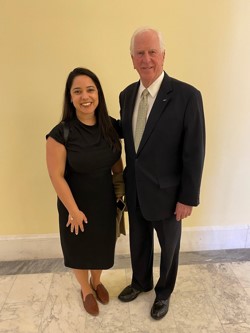Guest blog by Stephanie Martinez of the Peter E. Haas Jr. Family Fund
Outside the U.S. Capitol, it was an unexpectedly beautiful winter day in D.C. - 60 degrees of sunshine with a breeze. Inside, we walked alongside energized groups navigating the buildings on their own missions. As part of the Foundations on the Hill delegation, Kevin Douglas, Senior Director of National Programs at Grantmakers Concerned with Immigrants and Refugees (GCIR), guided a group of six of us in and out of the long halls and winding tunnels. In my excitement at being in the People’s House for the first time, where power could lead to transformation or repression, I thought back to the years of the Trump Administration’s inhumane immigration policies.In 2015, I began my philanthropic journey as a staffer at GCIR. Over five years at GCIR, I worked on mobilizing philanthropic resources in support of disaster relief and legal services for undocumented families. During this time, organizations supporting our communities carried out their essential work in extremely threatening conditions, especially those on the front lines. The racism, xenophobia, and hate that characterized the Trump era united the immigrant justice movement to stand in defense, fight back, and protect our communities.
That day in D.C., I walked alongside the GCIR team again, this time as the Program Manager for the Peter E. Haas Jr. Family Fund. As a foundation, we support organizations helping immigrants lead dignified lives in Sonoma County and nationally while working to strengthen our democracy. Joining GCIR on the hill that day aligned with my purpose as a funder and as the daughter of immigrant parents from Mexico. This was an opportunity to use the Fund’s influence to join with others in philanthropy to speak directly to our elected policymakers, using our voices as immigrants to advocate for legislation that advances the inclusion and belonging of our families and neighbors.
Over two days, we met with the offices of Senator Alex Padilla, Representative Jesus Garcia, Representative Judy Chu, and a long list of others. GCIR President Marissa Tirona grounded each conversation in GCIR’s mission of galvanizing philanthropy to move money and power to immigrant, refugee, and asylum-seeker communities. With others from the GCIR team, we highlighted the national policy priorities identified by the immigrant justice movement, along with potential solutions for addressing these issues. As the representative of a philanthropic organization, I had the opportunity to highlight how those solutions would strengthen legal and economic pathways for immigrants while also strengthening rural communities like those in Sonoma County. With every step I took in those powerful hallways, I felt waves of emotion at having a seat at the table in a space that vibrated with endless possibilities and with the hopes and dreams of so many. Our group felt like a force that couldn’t be stopped as we stood in our values of immigrant justice and belonging.
We carried our message into the many chance encounters we had during our time in the Capitol, like catching Senator Jon Ossoff of Georgia after an interview, taking selfies with Senator Cory Booker of New Jersey, and admiring the office of Representative Pramila Jayapal of Washington, a prominent leader on immigration. It wasn’t until the last hour of the second day of walking those halls that I fully understood why it was so important for me to be in a place where I never imagined myself. It was when my district representative Mike Thompson walked out of his office and we were heading straight toward each other. Without hesitation, I reached out to shake his hand and told him who I was. Stephanie Martinez, born and raised in Napa, representing the team at the Peter E. Haas Jr. Family Fund, a local foundation that helps strengthen community-based organizations in Sonoma County. That was a moment to use my power and hand him the policy agenda asking him to advocate for immigration reform. I felt proud to represent my migrant parents, the immigrant agricultural workers in Napa and Sonoma counties, the DACA recipients who have contributed so much to this country, the asylum seekers at every port of entry, and the immigrant justice movement leaders and organizations I admire.
While it is imperative that philanthropy respond to the urgent needs of our communities, we must also do the work now to advance changes that may not take place for many years. Funders advocating on federal, state, and local policy issues have the opportunity to use our privilege and power to tackle the challenges that deny individuals the freedom to stay, move, work, transform, and thrive in the communities we support. Just the week before, when we landed in D.C., the Biden administration proposed new restrictions on access to asylum, denying individuals the ability to seek safety at the U.S. border unless they were lucky enough to have secured an appointment through the flawed CBP One app or had already applied for asylum in another country and had their claim rejected. Advocating for immigrants and refugees is ever-changing work and requires a long-term vision. As the GCIR team continues to partner with movement leaders to advance key policy objectives, they are providing us with a playbook we can use to move beyond grantmaking. Let’s partner, act boldly, and use our power to advance change for immigrant and refugee communities.


